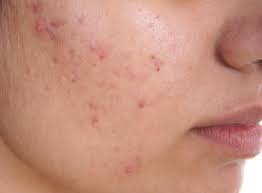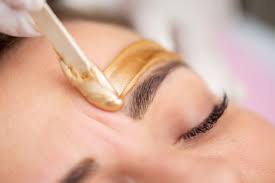
Acne (pimples)

Apply apple cider vinegar
- Apple cider vinegar is made by fermenting apple cider, or the unfiltered juice from pressed apples. Like other vinegar, it's known for its ability to fight many types of bacteria and fungi.
- Apple cider vinegar contains organic acids, such as citric acid, that have been found to kill acne. Research has shown that succinct acid, another organic acid, suppresses inflammation caused by acne, which may prevent scarring.
- Lactic acid, another acid in apple cider vinegar, may also improve the appearance of acne scars. While certain components of apple cider vinegar may help with acne, there's currently no evidence to support its use for this purpose.
- Some dermatologists advise against using apple cider vinegar at all, as it may irritate the skin.
- How to use it Mix 1 part apple cider vinegar and 3 parts water (use more water for sensitive skin).
- After cleansing, gently apply the mixture to the skin using a cotton ball. Let sit for 5-20 seconds, rinse with water and pat dry.
- Repeat this process 1-2 times per day, as needed. It's important to note that applying apple cider vinegar to your skin can cause burns and irritation. If you choose to try it, use it in small amounts and dilute it with water.
- Summary
- The organic acids in apple cider vinegar may help kill acne-causing bacteria and reduce the appearance of scars. Applying it to the skin may cause burns or irritation, so it should be used carefully.
Make a honey and cinnamon mask
- Honey and cinnamon have the ability to fight bacteria and reduce inflammation, which are two factors that trigger acne.
- A 2017 study found that the combination of honey and cinnamon bark extract exerted antibacterial effects against acne.
Other research has indicated that honey on its own can block the growth of or kill acne.
- Although, this finding doesn't necessarily mean that honey effectively treats acne.
- A study in 136 people with acne found that applying honey to the skin after using antibacterial soap was no more effective at treating acne than using the soap on its own.
- While the anti-inflammatory and antibacterial properties of honey and cinnamon may reduce acne, more research is needed.
- How to make a honey and cinnamon mask,
- 1. Mix 2 tablespoons of honey and 1 teaspoon of cinnamon to form a paste.
- 2. After cleansing, apply the mask to your face and leave it on for 10-15 minutes.
- 3. Rinse the mask off completely and pat your face dry.
- Summary
- Honey and cinnamon have anti-inflammatory and antibacterial properties. They may help reduce acne, but more studies are needed.
Apply green tea to your skin
- Green tea is very high in antioxidants, and drinking it can promote good health.
- It may also help reduce acne. This is likely because the polyphenols.in green tea help fight bacteria and reduce inflammation, which are two main causes of acne.
There isn't much research exploring the benefits of drinking green tea when it comes to acne, and more studies are needed.
- In one small study with 80 women, participants took 1,500 mg of green tea extract daily for 4 weeks. By the end of the study, women who took the extract had less acne on their noses, chins, and around their mouths.
- Research has also found that drinking green tea may lower blood sugar and insulin levels, which are factors that can contribute to the development of acne.
- Many studies also indicate that applying green tea directly to the skin may help with acne.
Research shows that the main antioxidant in green tea epigallocatechin-3-gallate (EGCG) reduces sebum production, fightsinflammation, and inhibits the growth of acne in individuals with acne-prone skin.
Multiple studies have found that applying green tea extract to the skin significantly reduces sebum production and pimples in those with acne.
- You can buy creams and lotions that contain green tea, but it's just as easy to make your own mixture at home.
- How to use it,
- 1. Steep green tea in boiling water for 3-4 minutes.
- 2. Allow the tea to cool.
- 3. Using a cotton ball, apply the tea to your skin or pour it into a spray bottle to spritz it on.
- 4. Allow it to dry, then rinse it off with water and pat your skin dry.
- You can also add the remaining tea leaves to honey and make a mask.
- Summary,
- Green tea is high in antioxidants that help fight bacteria and reduce inflammation. Some research indicates that applying green tea extract to the skin may reduce acne.
Moisturize with Aloe Vera
- Aloe vera is a tropical plant whose leaves produce a clear gel. The gel is often added to lotions, creams, ointments, and soaps.
- It's commonly used to treat abrasions, rashes, burns, and other skin conditions. When applied to the skin, aloe vera gel can help heal wounds, treat burns, and fight inflammation.
- Aloe vera contains salicylic acid and sulfur, which are both used extensively in the treatment of acne. Research has found that applying salicylic acid to the skin reduces acne.
- Several studies have also indicated that aloe vera gel, when combined with other substances like tretinoin cream or tea tree oil, may improve acne.
- While research shows promise, the anti-acne benefits of aloe vera itself require further scientific research.
- How to use it,
- 1. Scrape the gel from the aloe plant out with a spoon.
- 2. Apply the gel directly to clean skin as a moisturizer.
- 3. Repeat 1-2 times per day, or as desired.
- You can also buy aloe vera gel from the store, but make sure that it's pure aloe without any added ingredients.
- Summary,
- When applied to the skin, aloe vera gel can help heal wounds, treat burns, and fight inflammation. It may be beneficial for individuals with acne, but more research is needed.
Lemon Juice
- The acidic property of lemons can be very useful in treating acne. Lemon will clean out dirt that has accumulated in the pores and will harden the sebum. You can use it on your skin daily but if it is too drying then use it every two or three days.
- 1. Rub a slice of lemon on the affected area.
- 2. Leave it for a few hours before rinsing your face with water.
- Alternatively: Mix lemon juice with rose water in equal amounts and use the solution to wash the affected area thoroughly.


